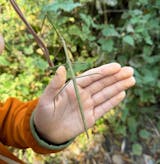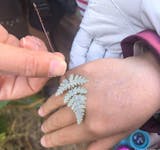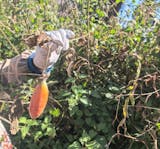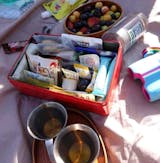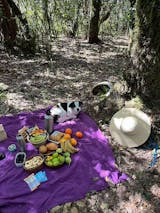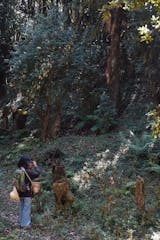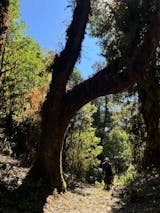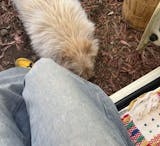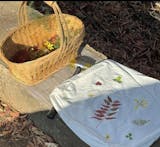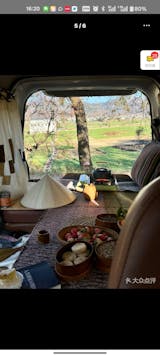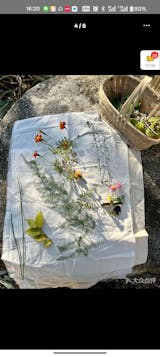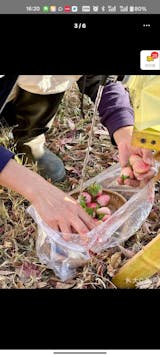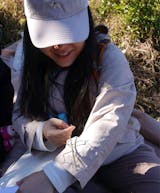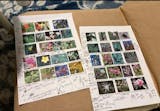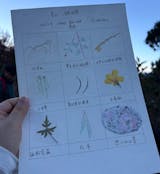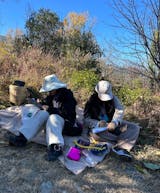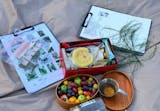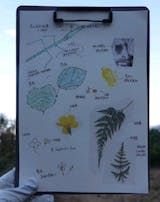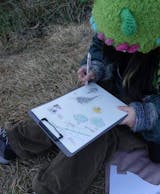
Diary of Weed Scene|Akita Fujisato Town
On the 8th day in Japan, I booked a B&B on Airbnb titled "Guest room with goats at the foot of Mt. Shirakawa", located in Fujisato Town, Akita Prefecture. I was attracted by the goats in the title and a photo in the introduction, which showed four young people lying on a narrow bridge, looking at the river under the bridge, with layers of green rice fields behind them.
Akita Prefecture has a sparse population and rich natural resources. As its name suggests, the main agricultural industry here is rice cultivation.
It is 80 kilometers from Hirosaki to Fujisato Town. First, take a 1.5-hour train to Futsui Station. Along the way, the train passed through villages and woods at close range. Everything in the previous hour was still covered with snow. The scenery outside the window is no worse than that of a special sightseeing train.
When we reached a certain section, the snow suddenly disappeared, and the villages and fields were suddenly exposed. From Hokkaido to Aomori, and then to Hirosaki, we saw a lot of snow along the way. Although the snow scene is beautiful, it is like sweet ice cream. If you take a bite, it is really delicious. If you eat it every day, you will not like it anymore. I also want to see if there is any snow.
The real world of snow.
As expected of Akita, there are large fields, but now the fields are bare, with only the cut straw left. In the summer, after the rice seedlings are planted, it should look like the movie "Little Forest".
When we arrived at Nitsui Station, the train stopped and we had to press the switch next to the door to open it. When we were about to walk to the exit, the driver in the cockpit stuck his head out and called us to hand over the ticket to him. It was the first time I encountered a train driver checking tickets. It seemed that we had arrived in a real rural area.
The Nitsuji train station is small, the whole waiting room is about 50 square meters, and there is one ticket salesperson. There is a kerosene stove in the middle of the waiting room, and it is very warm as soon as you walk in, a bit like the living room at home. There are some introductions to nearby attractions and seasonal events or festivals posted on the wall. There are also bicycles for rent, but they are only available from April to October.
To get to the B&B, you need to take a bus for a few kilometers. But it's not complicated, you can wait at the entrance of the train station.
There were only four passengers on the bus, including Jason and I. After the bus passed through the town next to the station, there were no more shops, only increasingly wide fields. There was a snowy mountain ahead of the road. Perhaps it was too far away, so the snowy mountain looked very small. However, although it was small, it became conspicuous because it was covered with silver light, like a pen drawing. After seeing it, I seemed to have the confidence to draw a snowy mountain. I guess I just need to trace it as it is now.
After getting off the bus, you need to walk across a bridge and then cross a one-kilometer field road to reach the village on the opposite side. Jason, who was leaning on a cane, stopped in the middle of the bridge, lit a cigarette, took out his mobile phone, and prepared to edit his Moments. This behavior represented his high satisfaction with this place.
We arrived at the B&B and knocked on the door, but no one responded. The door was not locked, so we stuck our heads inside and continued to shout. Finally, a boy came out, but he looked confused, as if he had no idea we were here. I took out my phone to show him my reservation, and hesitated for a long time.
"Ah, duozhu!" He finally reacted.
The guest room is on the second floor and has two bunk beds. After I put my luggage away, I felt hungry. It was then that I realized that I seemed to have forgotten to consider the issue of eating. I opened the map and found that the nearest restaurant and store were four kilometers away. There were no taxis, and the bus needed to be booked by phone. Walking four kilometers was not a problem for me, but it was not for Jason, who was walking on crutches.
In desperation, I opened the translation software and went downstairs to ask for help from the boy who had just received us (his name was Tagatani).
The entire communication between us was done by typing, without speaking.
Me: “Excuse me, can I make a reservation for dinner here?” I thought, since there are no restaurants nearby, he must have dinner himself, right?
Tagatani: "You can eat, but you need to go to the supermarket to buy it."
Me: “…” The translation may not be accurate, but I probably won’t be able to eat for free.
Me: "Can I rent a bicycle here?"
Tagatani: "Uh...I can call and ask for you." After thinking about it, he went to the kitchen to call his friend.
While he was on the phone, I looked around and, strangely, found no trace of sheep.
Tagatani: "No, I'm sorry, I can't rent a bicycle for you." After finishing the call, Tagatani looked apologetically and shyly.
Me: "It's okay, then where is the lamb?"
It seemed that the problem stumped him again. After scratching his head for a long time, he opened Google Maps and pointed to a place on the map. From the Chinese characters, it looked like a ranch, but it was not close.
Tagatani: "Do you want to go see the lamb?"
Me: "Yes, but it looks a bit far, maybe I won't go." I still want to eat more than the lamb.
Tagatani: "Besides going to see the lambs, where else do you want to go?"
Me: “I also want to go to the supermarket to buy food for the next two days.”
Tagatani: "Maybe I can drive you to see the lambs and stop by the supermarket on the way. We can pay an extra 1,000 yen for the room, okay?"
Me: "Okay!" 1,000 yen is equivalent to 50 yuan, and according to the taxi prices in Japan, he was just helping out of kindness.
I proudly told Jason the good news that we had a car to ride in, and we got on Tagaya's black minivan. The minivan made us feel at home, and the difference was that Tagaya's minivan was clean and tidy. All the way south from Hokkaido, whether in the countryside or in the city, everyone seemed to love minivans, and even many cars were made in square and round shapes, which were very cute.
Jason and I sat in the back seat of the van, like two city dwellers who had never seen the world entering the countryside for the first time. We also shouted "Wow wow wow" when we saw the ducks on the roadside (especially Jason), while Tagatani in the driver's seat didn't say a word. He was the kind of person who could be felt to be shy and restrained even at a distance of 100 meters. But when Jason shouted "Wow wow", I saw Tagatani secretly laughing in the rearview mirror.
The van drove through the fields towards the mountains. The road was winding and surrounded by straight cedar trees on both sides. Jason and I started to exclaim again because it really looked like the scene in the movie "Narara God Goes to the Village". It turns out that Akita's cedar trees are also very famous. The Akita cedar trees that are abundant here are called "Japan's three most beautiful cedars".
We felt that even if we didn’t see the lambs, we would have been quite satisfied just to take Tagaya’s minivan for a tour of the surrounding mountains.
After arriving at the ranch, Tagatani told me that he was not familiar with the place either and he needed to ask if he could go in and see the lambs.
The ranch was a long wooden bungalow with windows. I could barely see the lambs from the window by standing on tiptoe. I told Tagaya that I had already seen the lambs, but he still wanted to take us in to see them.
When I saw sheep up close, the first thing that popped into my mind was the image of the sheep man described in Haruki Haruki's novel. Now, after seeing a real sheep covered in dirty wool, the image became more concrete. This was the first time I saw sheep in real life. Jason said that in Japan, sheep are an alien species and are not common animals. So, is it any wonder that there is "A Sheep Chase"?
However, there is one thing I really don't understand. The description of the B&B clearly says "a house with goats", but why are the goats in a ranch so far away? And Tagatani also said that he is not familiar with this place. He doesn't look like the kind of person who would use "goats" as a gimmick in the description of the B&B to deceive people.
On the way home, we went to the supermarket. Although the town is small, the supermarket has a wide variety of things, including many things that can be eaten directly at home, and several choices of sashimi. Jason and I wanted this and that, and accidentally bought two large bags, so we don't have to worry about it anymore.
When we got home, we divided the food into two categories, "to be eaten immediately" and "to be eaten slowly". We then spread out the former and prepared to enjoy them, and put the latter in the refrigerator.
Tagatani's kitchen was clean, but these days, the people we stayed at were very clean, spotless. Judging from the condition of the refrigerator, he didn't seem to cook much. Now I understand what he said before: I have to go to the supermarket to buy food.
While we were sorting the food, Tagatani was busy adding firewood to the sunken stove in the middle of the living room. The stove looked a bit like our Tibetan stove, but more delicate. After the food was served, I sent Jason to invite Tagatani to eat with us. I thought he would not come because he was shy. Unexpectedly, he said, "Ah, is it really okay?" and followed Jason over.
Jason said, “Maybe he didn’t know how to say no.” Anyway, we sat together and ate.
I still wanted to know what the sheep in the property description was about, so I couldn’t help but take out my phone.
Me: "I saw sheep mentioned in the description of the B&B. Have you ever raised goats before?" In order to avoid any accidents, I typed the word "goat".
Tagatani: "I have goats five minutes from here. I'm going to feed them later. Do you want to come with me?"
Me: “…go”.
He has sheep, but he drove us to such a faraway ranch to see them. Why? Is it because I asked him "Where are the lambs?" He scratched his head for a long time. Maybe it's because the sheep he raised have grown up and are no longer lambs. He thought I wanted to see the lambs, not his big sheep, haha, is that right? That's so cute. I felt sorry, but I thought it was fun.
It turns out that in Japan, if you say the word "羊" alone, they may think it refers specifically to "sheep". And goat is another word. In China, it seems that all sheep can be replaced by "羊". Well, the more important thing is that I shouldn't add the word "小" in front of the word "羊".
During the meal, we kept translating what we wanted to say to each other. Jason wanted to know if Tagatani was married, but I felt that it was not appropriate to ask this question at this time. So we asked, "Do you live here alone?" He also asked us, "Why did you come here?" and so on.
Finally, he asked, "Can my two friends come over to talk in the evening?" I said yes.
It seems that although he looks introverted, he is not the type who avoids socializing.
Go feed the goats in Tagaya.
Before we set off, Tagatani changed his clothes, probably because he wore them every time he fed the goats, and took a pair of gloves from a small pickup truck parked at the door. Then he drove his black van again and took us off. This time we drove directly to the mountain asphalt road behind the house, and it took only five minutes to get there. It was a simple goat house built with wooden boards, located at the foot of the mountain. There was a big chestnut tree next to the goat house, and there were many chestnut shells left over from autumn on the ground, and a small piece of snow that had not melted.
When Tagatani opened the goat house, three goats had already escaped to the compartment storing hay. They were white and pretty. Compared to the sheep in the pasture, who were covered in gray and black wool blankets, the three of them were like three little princesses. Tagatani gave me some cabbage leaves and let me experience feeding the goats. When I stuffed the leaves into their mouths one by one, they would tilt their heads proudly, as if to say, "I'm cute, I'm cute." After I fed Tagatani the specified amount of cabbage leaves, he didn't forget to "thank" me.
At about 7:30 in the evening, Tagatani asked, "My friends, can they come over now?"
"Okay!" we answered.
Tagaya's friends are a couple, they look like they are in their 30s, but they are actually in their 40s. The boy is called Yasu and the girl is called Megumi. They live next door, just a minute's walk away. When Megumi came in and said to us, "Can you speak English?", Tagaya, who was standing next to us, said something in Japanese that I didn't understand. Jason said it meant "relieved".
However, the girl's English was not very good (mine was not good either). In order to communicate better, Jason simplified his words in his mind before speaking them out loud, which made him stutter a little. He also imitated the Japanese intonation in his voice. In this way, everyone's language level seemed to be much more in line. In this regard, Jason was very considerate. Later in the conversation, he even started to mix Japanese words into his English, which was a good opportunity for him to practice Japanese.
We talked about cartoons and our respective jobs. Yasu is a horse racer and Megumi is a boxing coach. But Megumi looks delicate and gentle, not like a typical boxer. They are back here now, helping Yasu's candy business together.
Tagaya had told Jason before that he was doing some farming here. I was curious about what he was growing, so I asked. Unexpectedly, Tagaya asked us, "Do you want to go and take a look?" So we put on our shoes, went around the door and went into the next room. When we opened the door, we found an unexpected planting room. It turned out that Tagaya was growing small leafy vegetables that were put in salads. I had never noticed this kind of vegetable before, but I found it in the side dishes I had at the izakaya a few days ago.
This place looks like a microscopic plant laboratory. The temperature and humidity seem to be strictly controlled. There is also a blackboard for recording. There are sticky boards for catching insects next to the plants, and many small black insects were caught. Each pot of small leaf vegetables looks like a mini bonsai, very cute. There are also a few pots of small leaf vegetables with some yellow leaves, which are placed in a special area and look like they are being rescued. Tagatani brought a pair of mini scissors and cut two varieties from the pots that did not need to be rescued for us to taste.
At the end of the chat that night, Yasu and Megumi asked: "If you don't have anything to do tomorrow night, can we come again? If you are free." "Sure!" Jason replied.
During the journey, communication with people is still important. It will directly lead to our feelings about the place, just like sitting together and chatting, slowly getting to know each other's lives. Such a connection naturally makes me miss this place and want to come back next time.
The next day, we hiked in the direction of the goat house. The night before, after hearing that I like to pick mushrooms, Megumi showed us a picture of a wild vegetable that grows in spring. Because it was beautiful and special enough, I remembered it. I found them growing on the grass slope on the hiking trail. I checked and found that it was a wild vegetable called "Butterbur", which is a plant of the Asteraceae family and smells like chrysanthemum. Then the whole hike became a wild vegetable picking activity.
After we got home, we immediately checked with Tagaya and asked him if he would like to eat it with us in the evening. He said he wanted to.
Because I picked a lot, I blanched half of the butterbur and drizzled it with hot oil to make a cold dish. I chopped the other half and fried it with fried rice. To be honest, it wasn't very tasty and a bit bitter. Jason ate two and stopped eating, and even translated the words "tastes like medicine" to Tagatani. But Tagatani seemed to like it very much and kept picking up more. If he hadn't given me a few to eat, he would probably have eaten the whole plate.
Later, I bought a bottle of miso sauce made with butterbur at the Shinkansen train station in Akita. I opened it and tasted it after returning to Dali. It was not bitter at all and tasted very good. I regretted not buying more bottles. Later, when I was reading the introduction of Akita Prefecture, I unexpectedly discovered that butterbur was printed on the stamps of Akita Prefecture.
This is a diary, and I found it is so long as I was writing it.
Perhaps the feeling of a person on a journey is like that of a couple who have just met. Even if it is just the touch of fingertips, they will feel their heartbeat speed up. Perhaps it is precisely because we need such a magnified feeling that we need to travel.
March 2024






